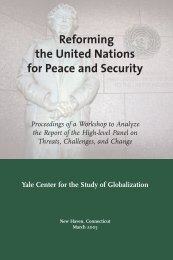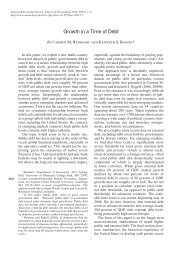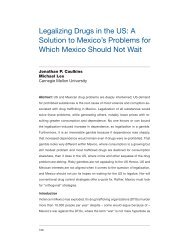The collapse of global trade, murky protectionism, and the crisis:
The collapse of global trade, murky protectionism, and the crisis:
The collapse of global trade, murky protectionism, and the crisis:
Create successful ePaper yourself
Turn your PDF publications into a flip-book with our unique Google optimized e-Paper software.
12. Commodities, export subsidies, <strong>and</strong><br />
African <strong>trade</strong> during <strong>the</strong> slump<br />
Tonia K<strong>and</strong>iero, Abdul Kamara <strong>and</strong> Léonce Ndikumana<br />
African Development Bank<br />
<strong>The</strong> steady increase in <strong>trade</strong>, especially exports, has been a major driver <strong>of</strong> past<br />
growth performance <strong>global</strong>ly as well as in Africa. However, while African exports have<br />
grown significantly <strong>and</strong> <strong>of</strong>ten at par with world <strong>trade</strong>, <strong>the</strong> continent's share in <strong>global</strong><br />
<strong>trade</strong> remains low. African exports represented 5.4% <strong>of</strong> world exports in <strong>the</strong> 1960s;<br />
this ratio has declined to only 2.6% today. Intra-Africa <strong>trade</strong> is also very low, representing<br />
only 8% <strong>of</strong> exports <strong>and</strong> 9% <strong>of</strong> imports. By comparison, intra-Asia <strong>trade</strong><br />
accounts for 45% <strong>of</strong> Asian total <strong>trade</strong>.<br />
African <strong>trade</strong> <strong>and</strong> <strong>the</strong> <strong>crisis</strong><br />
Today, African <strong>trade</strong> performance is threatened by <strong>the</strong> current economic <strong>crisis</strong> which<br />
has reduced <strong>global</strong> dem<strong>and</strong> <strong>and</strong> weakened credit markets. Exports from Africa are predicted<br />
to decline by as much as 7% in 2009; <strong>the</strong> last decline in African exports was<br />
recorded in 2001 (UN, WESP 2009).<br />
Lower export dem<strong>and</strong> has already caused substantial job losses in export-oriented<br />
sectors. In Angola, <strong>the</strong> diamond mining company De Beers warned in December 2008<br />
that cuts in production would cause more than 1,000 job losses. In <strong>the</strong> Democratic<br />
republic <strong>of</strong> Congo, declining activity in <strong>the</strong> mining sector has resulted in an estimated<br />
100,000 job losses.<br />
As a result <strong>of</strong> reduced dem<strong>and</strong> for exports <strong>and</strong> a slowdown in private sector activity,<br />
<strong>the</strong> continent's growth prospects are bleak. A meagre 2.9% real GDP growth rate<br />
is expected for 2009, down from 6% in 2007 <strong>and</strong> 5.7% in 2008 (African Development<br />
Bank). <strong>The</strong> tourism sector has also not been spared, with tourist arrivals falling worldwide.<br />
<strong>The</strong> 2% growth in 2008 is now projected to be reversed with probable negative<br />
growth in 2009. Kenya Airways, for instance now expects its pr<strong>of</strong>its to be cut by 25%,<br />
due to <strong>the</strong> financial <strong>crisis</strong>.<br />
Promoting African <strong>trade</strong> is <strong>the</strong>refore critical to avoiding a growth <strong>collapse</strong>, which<br />
will jeopardise <strong>the</strong> modest gains achieved in poverty reduction. However, efforts to<br />
increase <strong>and</strong> sustain <strong>trade</strong> are confronted with several key constraints:<br />
• Falling commodity prices;<br />
• Procyclical <strong>and</strong> declining <strong>trade</strong> volumes; <strong>and</strong><br />
• Inadequate <strong>and</strong> inefficient physical <strong>and</strong> s<strong>of</strong>t infrastructure.<br />
59





